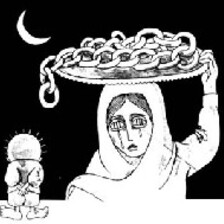The view framed in the windscreen of the taxi as we turned the corner and entered Jenin refugee camp is one of utter devastation: a massive concrete-grey pile of rubble. Planted on top of the rubble, are several flags and graffiti testifies to a desperate allegiance to Saddam Hussein, and to Lebanon’s Hizb’Allah fighters. Elsewhere, scribbled on lumps of concrete are the words: ‘Sharon made his grave here,’ ‘1982- Sabra Shatila massacre, 2002- Jenin massacre’ and ‘We will never forget.’ Supposedly, the objectives of Operation Defensive Shield was to root out terrorism, yet the clear message, on display for the cameras of the world’s newspapers, is that Sharon’s brutal tactics have backfired.
The people of Jenin are desperate to talk. ‘We are refugees from a refugee camp. When will our suffering end?’ Muhammad Abdel Khader El-Rozzi begins. Leaning heavily on his walking stick, he spends his days wandering over the rubble. He has lived in Jenin camp since 1948 when he fled his village near Haifa, and the people buried under the rubble were his relatives and neighbours. As his words are being translated, he looks down at his wrinkled hands, his grey eyes misting over, ‘I could speak for 20 years about the suffering of the Palestinian people. Everything the [Israelis] have done shows to the world that they are the terrorists.’
Over cups of strong, black coffee endless nightmarish stories are recounted, to a background roar of F-16s, which still fly low over the camp. Sari Baddi Khalil Moussa, 17 years old, spent 2 days buried under his neighbour’s house when the roof collapsed on him. Children heard his cries and he was rescued unhurt. Mohammad waits impatiently for Sari to finish and then pulls out his ID. He was arrested, and spent 4 days in an Israeli prison near the village of Salim. His wrists are circled with dark red welts where the plastic handcuffs cut deep into his skin. He says he was blindfolded, kicked and beaten. When they released him, the word ‘terrorist’, written in Hebrew, was stamped on his ID card.
It is still unclear just how many people died; probably, as with the Sabra and Shatila massacre, an exact figure will never be known. O., a leading member of the camp committee, says that 53 bodies have been found and reckons between 60-70 are still buried under the rubble. He also claims that a further 85 bodies have been taken away in refrigeration trucks to a ‘terrorist mass grave’ in the Jordan valley. He has been involved in digging out the bodies, and described how he saw chickens pecking at the corpses. As we got up to leave, the mosque announced that another body had been found buried under the rubble.
Suliman Abu-Zeini invited us to look at a house, and led us through the chaotic mess of staircases, tangled iron rods and furniture. The front door of the house is splattered with dried blood and riddled with bullet holes. As he pushed it open to show us inside, Suliman tells how he spent 7 days hiding in his neighbour’s cellar, along with about 100 other people, while first soldiers searched his house, and then F-16s rained the neighbourhood with missiles. ‘We were men, woman and children, even terrified stray cats, all together in one dark room,’ he recounts. ‘We had no food, no water.’ The room at the top of the stairs is soot black and smells of death. Suliman shrugged his shoulders in dismay, finally lost for words. The shell of an apache rocket, wrapped in coils of metal thread, lies on the floor on a bed of cinders. Apparently, four people were in the room when it was hit.
‘When the terrorists attacked the World Trade Centre, the world supported America. Why are we different? Are we not human too?’ one man asked. He showed me a photograph of his son, who he hasn’t seen for the last 3 weeks. He is resigning himself to the fact that he is probably dead. ‘Israel will never achieve peace this way.’ He looked me straight in the eyes: ‘We will not forget or forgive. Why should we? Sharon has created many new terrorists who are prepared to die because of what he has done here. I would be a suicide bomber, what do I have left: my family is dead and my home is destroyed?’
Palestinians call it a massacre and it will be remembered as one, imprinted in people’s memories alongside past massacres which punctuate Palestinian history, like Sabra and Shatila and the Deir Yassin.


